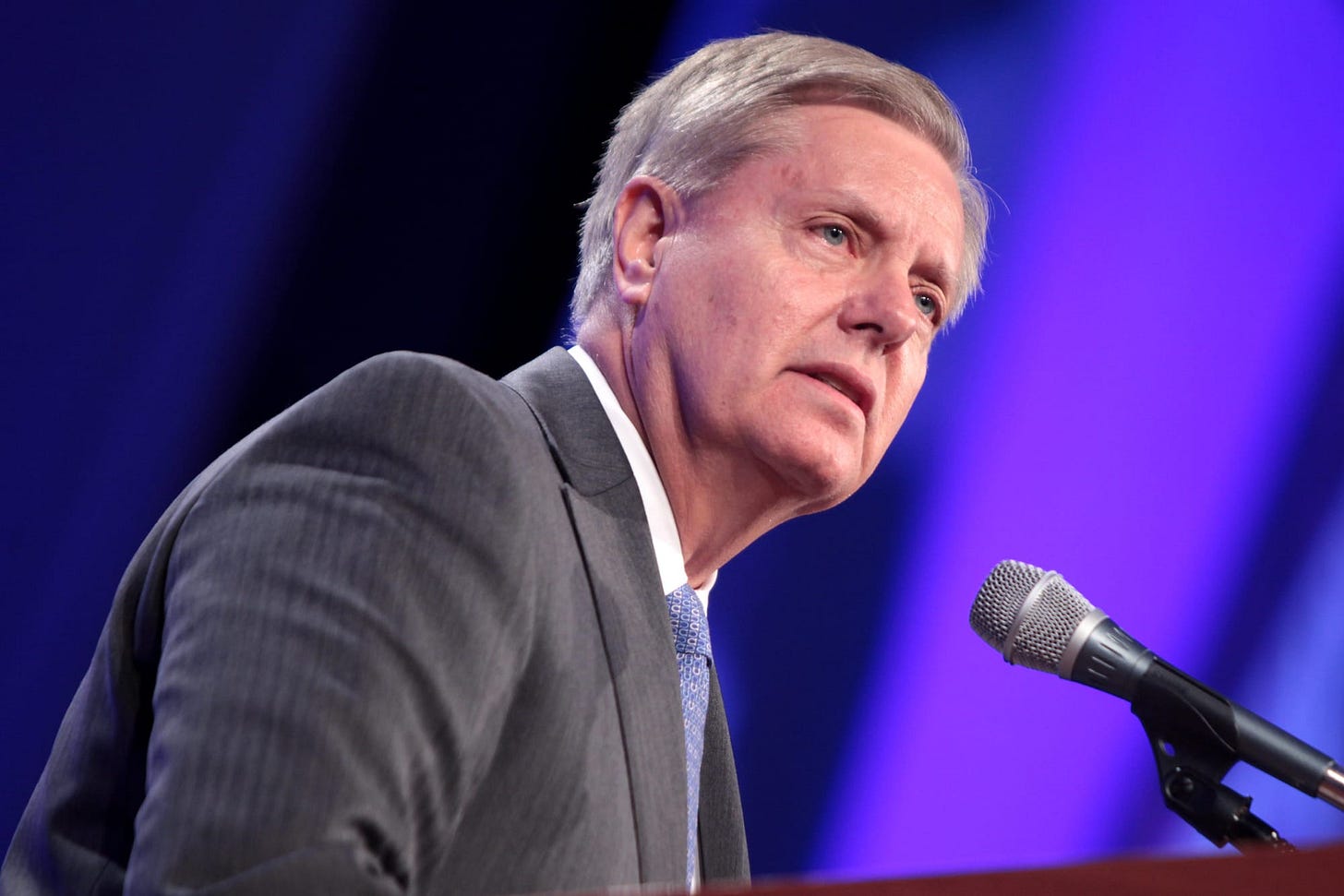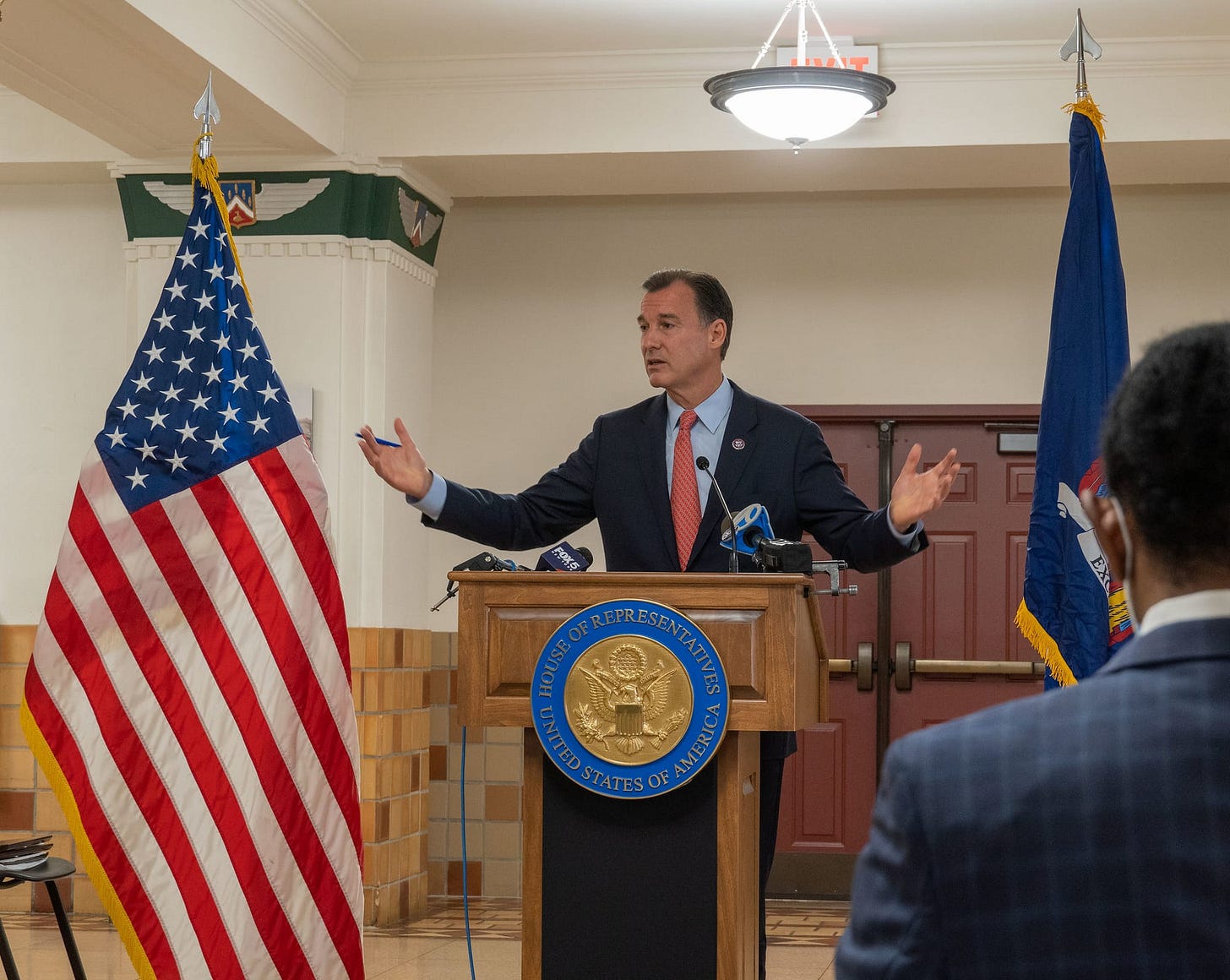Trump’s GOP wrestles over America’s place in the world
As Trump expands his imprint on the party, traditional Republican defense hawks are beginning to change their tune.
Good morning! It’s Tuesday, February 13, 2024. Election Day is 266 days away. If this newsletter was forwarded to you, subscribe here. If you want to contribute to support my work, donate here.
Around two weeks after the Capitol riot, on January 19, 2021, The Wall Street Journal reported that Donald Trump had been having conversations with associates about forming a new political party when he left the White House. He planned to call it the “Patriot Party,” the report said.
It was the end of Trump’s presidential term and he had just been impeached for a second time. Republican leaders across Washington had condemned his actions on January 6th. He was about to skip town before President Biden’s inauguration, returning to a lonely exile at Mar-a-Lago. This was before Kevin McCarthy flew to Florida to rehabilitate him; before he proved his staying power in the GOP with his 2022 primary endorsements.
According to a book by Jonathan Karl, RNC chairwoman Ronna McDaniel told Trump at the time that if he went forward with his plans, the GOP “will lose forever.” Trump didn’t care. “He viewed the destruction of the Republican Party as a punishment to those party leaders who had betrayed him,” Karl reported.
Trump must be glad that he didn’t go through the trouble of starting a new party. Because, in the end, he got a much better deal: a near-complete remaking of the Republican Party in his image.
Last night, he moved to formalize that takeover by announcing his support for a trio of candidates who will likely assume control over the RNC. To replace McDaniel — who Trump himself installed, but now feels has been insufficiently loyal — Trump is backing Michael Whatley, the chairman of the North Carolina Republican Party. According to The New York Times, Trump likes Whatley because he views him as a “stop the steal guy,” after Whatley endorsed Trump’s false claims about the 2020 election.
Trump also tapped Chris LaCivita, his top campaign aide, to become the RNC’s chief operating officer. And, for the final flourish, he endorsed his own daughter-in-law, Lara Trump, to become co-chair of the committee. Three years after the ex-president considered abandoning the party, a literal Trump will be at the helm of the GOP, helping steer her father-in-law to his third straight Republican nomination.
Of course, the last gasps of the old Republican order are still evident. Early this morning, the Senate — the strongest redoubt of Republican anti-Trumpism left — was still able to approve a $93 billion Ukraine and Israel foreign aid package by a sweeping 70-29 vote.
The vote cleaved the Senate GOP almost perfectly in half: 22 Republicans supported the package, including Senate Minority Leader Mitch McConnell (R-KY), who has not spoken to Trump in years. 26 Republicans voted against it.
Partially due to Trump’s opposition, though, the bill faces a shaky path to becoming law. House Speaker Mike Johnson (R-LA) — who also rose to his job with Trump’s endorsement, after proving his election denier bona fides in 2020 — bashed the measure in a Monday night statement for excluding any border security measures. (The foreign aid was originally attached to a bipartisan border security bill, but that package was defeated in the Senate at Trump and Johnson’s urging.)
Perhaps the most notable feature of the Senate roll call was how many Republican defense hawks voted against the aid package, trading in their traditionally internationalist outlooks for Trump’s “America First” sentiments.
These “nay” votes included Sens. Tom Cotton (R-AR), Lindsey Graham (R-SC), and Marco Rubio (R-FL).
Graham, for instance, has been a booster of foreign aid since his globe-trotting days with John McCain. Less than two years ago, he compared opposition to Ukraine aid to “the policy of appeasement” at the beginning of World War II. “While we have many problems and challenges here at home — broken borders, a broken supply chain, rampant inflation, spiraling debt — none are made better by Putin winning in Ukraine,” Graham said then.
On Monday, he called for any further aid to Kyiv to be structured as a loan, a break with his own past statements. He made sure to credit where he got the idea from (twice in a single paragraph).
“The supplemental aid package should be a loan to the countries in question, as suggested by President Trump,” Graham said. “A loan on friendly terms allows America, who is deeply in debt, a chance to get our money back and changes the paradigm of how we help others. President Trump is right to insist that we think outside the box.”
Recent days have brought other signs of the GOP’s Trump-induced march towards isolationism.
Over the weekend, Trump boasted to a South Carolina rally crowd that, while in office, he told a European leader that he would encourage Russia to “do whatever the hell they want” in the leader’s country — including invade — if the country did not pay more in NATO dues.
“No, I would not protect you,” Trump said he told the leader, threatening to break America’s mutual defense commitments under Article V of the NATO Treaty.
During Trump’s presidency, when he criticized NATO — which has been America’s most important military alliance, receiving bipartisan support, since its 1949 founding — Republican condemnations would often follow.
This week, though, Trump’s comments were met mostly with silence. As The Atlantic’s Mark Leibovich wrote recently, there is a rote quality to the GOP’s support for Trump now, even more so than when he was president. “The Republican Party now appears to have entered a new level of capitulation to Trump: a kind of ho-hum acceptance phase, where slavish devotion has become almost mundane, like joining a grocery line,” as Leibovich put it.
Many Republicans who have spent years defending NATO shrugged off the comment. “Obviously, that is not something I believe that he should have said, but also I don’t believe it’s something that he honestly believes,” said Sen. Thom Tillis (R-NC), who was described as a “NATO-loving Republican” last year.
Rubio, meanwhile, told CNN that he harbored “zero concern” about Trump’s comments.
“Donald Trump is not a member of the Council on Foreign Relations,” Rubio said. “He doesn’t talk like a traditional politician, and we’ve already been through this. You would think people would’ve figured it out by now.”
Last year, Rubio successfully fought for the passage of a law preventing a future president from withdrawing from NATO.
He is apparently concerned enough about the fate of NATO to tuck that provision into the annual defense package, but not concerned enough to criticize his party’s leader for threatening to gut the very heart of the alliance.
More news to know.
An Outburst by Trump on NATO May Push Europe to Go It Alone / NYT
How Biden botched the border / Axios
Inside Trump’s plans to deport millions from the U.S. / Axios
Trump asks justices to intervene in Jan. 6 case / SCOTUSBlog
Senate GOP campaign arm endorses Kari Lake / Politico
Medicaid’s prescription for health includes food and housing in some states / WaPo
FAFSA glitches and delays leave students, states, institutions in limbo / WaPo
House Republicans request transcripts of Biden’s interview with special counsel / NBC
Judge says DA in Trump election case could be “disqualified,” misconduct hearing “must” occur / ABC
Austin cancels trip to Brussels for Ukraine meeting due to hospitalization / Politico
The day ahead.
On the campaign trail: Voters in New York’s 3rd congressional district will head to the polls today in a special election to replace former Rep. George Santos (R-NY), who was expelled last year.
Democrats have nominated former Rep. Tom Suozzi (D-NY), who held the seat before Santos, for a comeback bid; Republicans have put forward county legislator Mazi Pilip, who was born in Ethiopia and served in the Israeli Defense Forces before moving to the United States.
The two camps have poured significant resources into the race, which will test the suburban support of both parties and their signature messages on abortion (for Democrats) and border security (for Republicans). If Pilip wins in the competitive district, the GOP will gain some breathing room in the House; if Suozzi wins, the party’s slim majority will grow even slimmer.
At the White House: President Biden and Vice President Harris will have lunch together and receive their daily intelligence briefing. Harris will also meet with King Abdullah II of Jordan.
At the Capitol: The Senate is out until February 26. The House is expected to try voting again on the resolution to impeach Homeland Security Secretary Alejandro Mayorkas, which failed last week. House Majority Leader Steve Scalise (R-LA), who was receiving cancer treatment during the initial vote, has returned to Washington, fueling GOP hopes that they will be able to approve the impeachment today.
Thanks for reading.
I get up each morning to write Wake Up To Politics because I’m committed to offering an independent and reliable news source that helps you navigate our political system and understand what’s going on in government.
The newsletter is completely free and ad-free — but if you appreciate the work that goes into it, here’s how you can help:
Donate to support my work or set up a recurring donation (akin to a regular subscription to another news outlet).
Buy some WUTP merchandise to show off your support (and score a cool mug or hoodie in the process!)
Tell your family, friends, and colleagues to sign up at wakeuptopolitics.com. Every forward helps!
If you have any questions or feedback, feel free to email me: my inbox is always open.
Thanks so much for waking up to politics! Have a great day.
— Gabe





